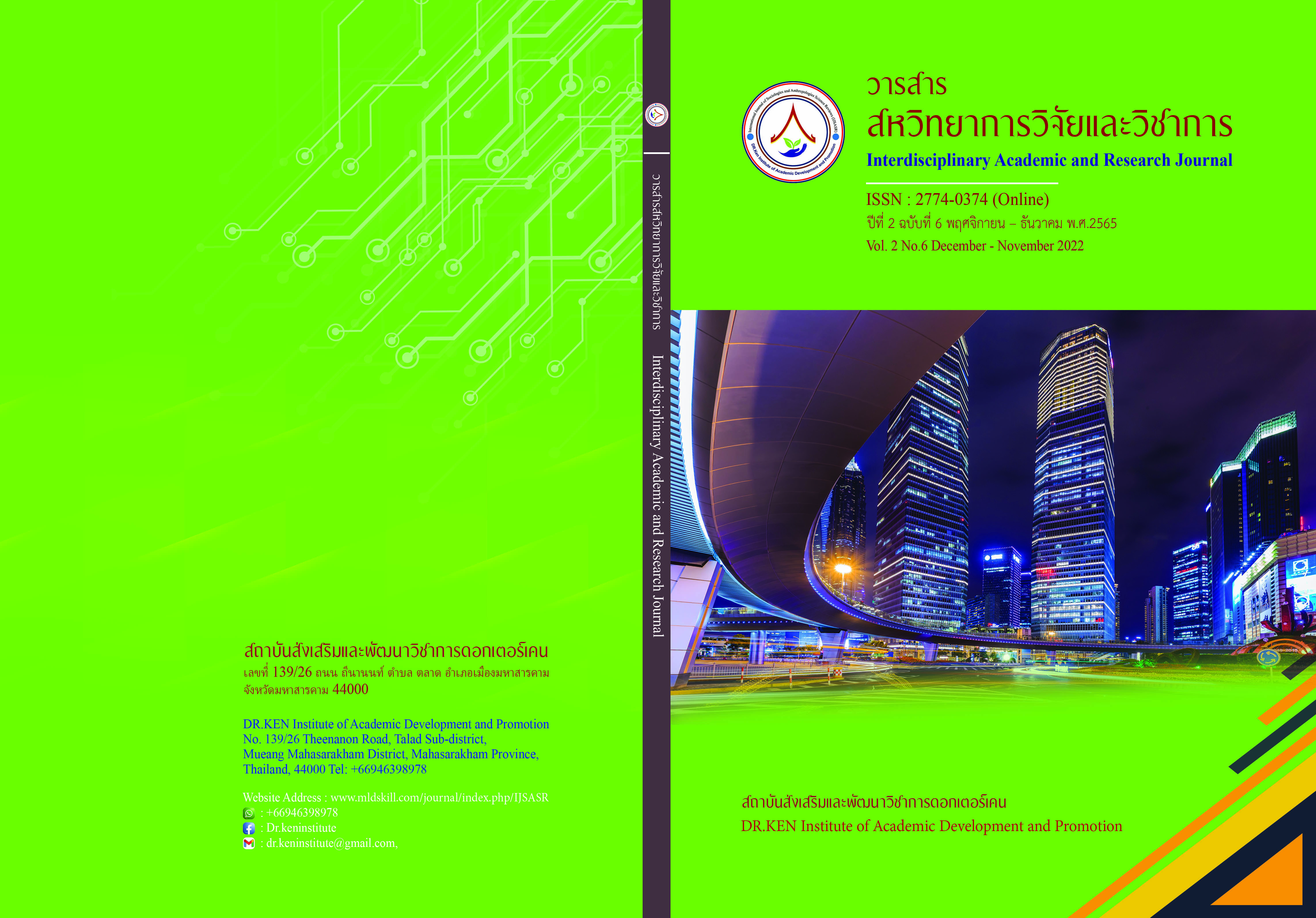Development Guidelines of Solid Waste Management in Local Government
DOI:
https://doi.org/10.14456/iarj.2022.173Keywords:
Community Solid Waste Management; , Community Solid Waste; , Local Government OrganizationAbstract
The overall management of municipal solid waste in Thailand still has a real problem, especially the situation of the amount of municipal solid waste of local administrative organizations is still a problem that many parties must urgently deal with. In this regard, many local administrative organizations have a place to eliminate waste, community that is still incorrect. Problems caused by waste management need to reduce waste and campaign to allow people to participate in management. Therefore, local government organizations should prioritize community solid waste management and should take the following actions: (1) Raising awareness about solid waste, including recycling, abstaining/reducing or avoiding the use and consumption of certain items, the use of resources and products to recycle resources to reuse. (2) Solid waste management operations, including reducing the amount of solid waste, campaign for public participation, organizing a recycling system, organizing a transport system and a combined disposal system. (3) Reducing the generation of solid waste, including promotion and support to reduce the amount of solid waste. Creation of a network of cooperation in organizing solid waste public services between local government organizations. Accelerate the locality to prepare solid waste management plans, both short-term and long-term. Issuing policies and measures, as well as local solid waste and sewage management guidelines. Construction of solid waste disposal plants to meet standards.
References
กรมควบคุมมลพิษ. (2550). คู่มือการปฏิบัติงานของเจ้าหน้าที่องค์กรปกครองส่วนท้องถิ่นในการเก็บรวบรวมขนส่งและกำจัดของเสียอันตรายจากชุมชน. กรุงเทพฯ: กรมควบคุมมลพิษ.
กรมควบคุมมลพิษ. (2563). สรุปสถานการณ์มลพิษของประเทศไทย ปี 2563. [Online] https://www.pcd.go.th/pcd_news/11873 [15 มิถุนายน 2565]
กรมส่งเสริมการปกครองท้องถิ่น. (2551). คู่มือความร่วมมือระหว่างองค์กรปกครองส่วนท้องถิ่น. กรุงเทพฯ: กรมส่งเสริมการปกครองส่วนท้องถิ่น.
ชัยพงษ์ สำเนียง. (2556). รัฐธรรมนูญกับการกระจายอำนาจ. เชียงใหม่: สถาบันศึกษานโยบายสาธารณะ มหาวิทยาลัยเชียงใหม่.
ภิศักดิ์ กัลยาณมิตร และ วชิรวัชร งามละม่อม. (2561). แนวทางการพัฒนาการจัดการขยะมูลฝอยขององค์กรปกครองส่วนท้องถิ่น. วารสารวิชาการแพรวากาฬสินธุ์ มหาวิทยาลัยกาฬสินธุ์. 5 (1), 172-193.
สภานิติบัญญัติแห่งชาติ. (2550). รัฐธรรมนูญแห่งราชอาณาจักรไทย พุทธศักราช 2550. กรุงเทพฯ: สภานิติบัญญัติแห่งชาติ.
สัญญา เคณาภูมิ. (2556). การสร้างกรอบแนวคิดการวิจัยเชิงสำรวจทางรัฐประศาสนศาสตร์. วารสารวไลยอลงกรณ์ปริทัศน์ มหาวิทยาลัยราชภัฏวไลยอลงกรณ์ ในพระบรมราชูปถัมภ์, 3(2), 169-185.
สัญญา เคณาภูมิ. (2557ก). ปรัชญาการวิจัย : ปริมาณ : คุณภาพ. วารสารรัฐศาสตร์และนิติศาสตร์มหาวิทยาลัย ราชภัฏกาฬสินธุ์, 3(2), 49-51.
สัญญา เคณาภูมิ. (2557ข). การสร้างกรอบแนวคิดการวิจัยทางรัฐประศาสนศาสตร์โดยการคิดเชิงเหตุผล. ราชภัฏเพชรบูรณ์สาร สถาบันวิจัยและพัฒนา มหาวิทยาลัยราชภัฏเพชรบูรณ์, 16(1), 1-19.
สัญญา เคณาภูมิ. (2557ค). การสร้างกรอบแนวคิดการวิจัยทางรัฐประศาสนศาสตร์โดยวิธีการจัดการความรู้. วารสารมนุษย์ศาสตร์และสังคมศาสตร์ มหาวิทยาลัยอุบลราชธานี, 5(2), 13-32.
สัญญา เคณาภูมิ. (2557ง). การสร้างกรอบแนวคิดการวิจัยเชิงปริมาณทางรัฐประศาสนศาสตร์จากการทบทวน วรรณกรรม. วารสารมนุษยศาสตร์และสังคมศาสตร์มหาวิทยาลัยราชภัฏอุดรธานี, 3(1),1-24.
Downloads
Published
How to Cite
Issue
Section
License
Copyright (c) 2022 กิตติญากานต์ ดวงภักดีรัมย์ , ภักดี โพธิ์สิงห์

This work is licensed under a Creative Commons Attribution-NonCommercial-NoDerivatives 4.0 International License.
Copyright on any article in the Interdisciplinary Academic and Research Journal is retained by the author(s) under the under the Creative Commons Attribution-NonCommercial-NoDerivatives 4.0 International License. Permission to use text, content, images, etc. of publication. Any user to read, download, copy, distribute, print, search, or link to the full texts of articles, crawl them for indexing, pass them as data to software, or use them for any other lawful purpose. But do not use it for commercial use or with the intent to benefit any business.
















.png)


